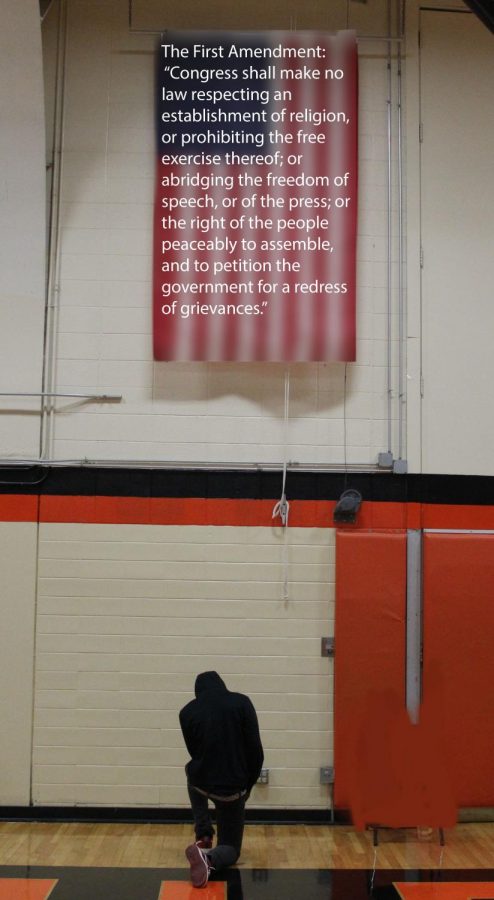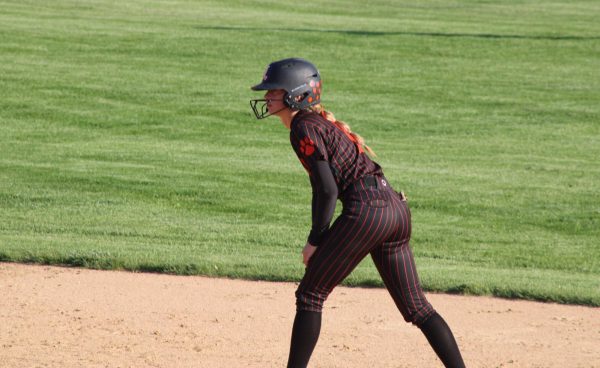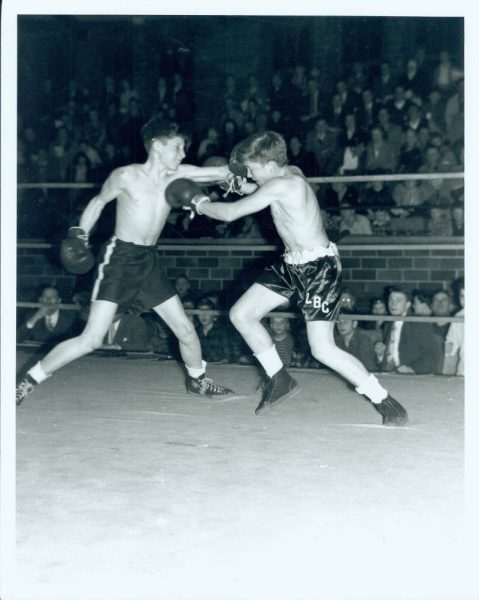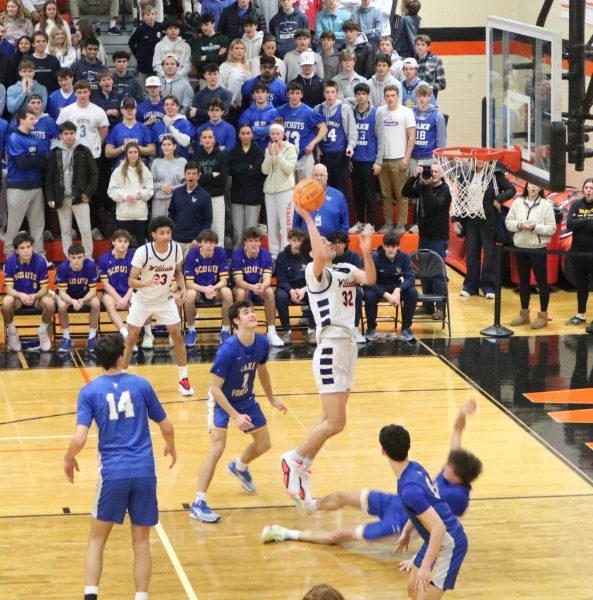Rise to kneel
LHS students, specifically football players and marching band members, have been “taking a knee” during the national anthem to protest inequality throughout the nation.
Throughout American history, many of the most impactful social protests have centered around the ever-changing American values. As social conflicts arise, symbols of change, represented through hands and fists, frequently rise in the air as well. Often the protests we recognize and study in our history classes occur on national levels, where millions of people take to the streets of major cities, demanding and encouraging national awareness.
However, Libertyville has experienced a more local level of protests. On Thursday, Sept. 28, as the crowd of Wildcat fans decked out in U.S.A.-themed spirit gear began to rise for the national anthem, a handful of band members and football players standing on the field began to kneel.
The protest, known as “Take A Knee,” originally began in order to draw attention to treatment that minorities have received for decades within the United States. The introduction of politics into sports is nothing new, and with these protests spreading throughout the country, the conversation about racial injustice was thusly raised to a national level. Former San Francisco 49ers quarterback Colin Kaepernick first raised his voice nationally by taking a knee on the field during the national anthem 14 months ago.
Initially, Kaepernick began his protest during the national anthem by sitting on the sidelines rather than kneeling; however, he changed his protest to kneeling in order to still show respect for veterans and those currently serving in the armed forces. His protests, as he has explained to the public, are centered around opposing the racist treatment he feels minorities and people of color are currently experiencing in America. Today, players, citizens and students alike are echoing his sentiments not only on a national level but on a local level, too.
Senior and drumline captain Kate Roleck knelt that Thursday evening. And as band directors Adam Gohr and Matthew Karnstedt made perfectly clear to her and her fellow band members, she had every right to do so.
“I chose to protest because I realize that living in Libertyville and being the person that I am, I come from a place of privilege and I want to be able to use that privilege to at least, if not help others directly, make a statement that will help teach others about what’s truly happening,” Roleck explained.
Roleck isn’t the only student who protested, and she acknowledged that other students are spreading their similar messages throughout the Libertyville community.
Multiple band members and two varsity football players knelt on that same field on Sept. 28, and as Roleck reasoned, “I think [the other protesters] did it for kind of the same reasons I did. I think that it was just because we felt passionate about the topic and that we all know that there’s something that needs to be done and [that] doesn’t mean that we were more correct than anyone else, it just means that we felt like there needs to be more done about what’s happening in the world around us.”
Libertyville students alike are speaking up and kneeling down for the same cause.
Varsity defensive end Greg Renix took a knee that night, accompanied by former teammate Alvin Hemphill.
Renix explained he wanted to stand up for his voice and rights through kneeling, specifying, “I was just thinking about the past of being black, and having a right to [protest] and wanting to do it…I wanted to portray [my protest] as just being an African-American man standing up for what I believe in.”
Renix also expressed his personal ties to the protests, and he explained he did it to shine light on how minorities are perceived in America: “I protested because, I just felt…being black, [African-Americans are] likely to not have a bright future, and [we’re] held to low expectations, and most African-American men are stereotyped to be thugs.”
Renix also stated he protested for himself, regardless of whether or not the protests at this football game made a difference nationally.
Students attending public high schools in America, including Libertyville High School specifically, have every legal right to demonstrate these exact protests, as Mr. Gohr made clear: “the Supreme Court says they have a right. It doesn’t matter what I think, it doesn’t matter what any teacher thinks about it; [the students] have a right to [protest]. That said, I fully support my students’ right to [protest] because that’s also my job. As professionals, we have an obligation to support our students.”
Staff members like Principal Dr. Tom Koulentes have also addressed the topic of the protests. His morning announcement video discussing the importance of respect and freedom of speech throughout LHS in regards to national anthem protests, which appeared the same week as the student protests at the football game, have resonated with students, especially Roleck: “[Dr. Koulentes] addresses all of the issues that are going on [and] he addresses them immediately,” she said. “I think that the way that [the LHS] administration is handling everything that is going on has been fantastic.”
It is important to note that under the Supreme Court ruling of Bethel v. Fraser, students’ right to free speech has been limited within American public schools. Nevertheless, the “Take a Knee” protests are traditionally non-disruptive and non-violent, which does not hinder the school’s ability to teach, according to teachers like Mr. Gohr and Mr. Karnstedt.
Head football coach Mike Jones promoted the rights of his players as well. Notably similar to the previous sentiments, Mr. Jones stated, “I feel [the students] have a right [to protest], and I’ll support whatever they choose to do. I don’t think it’s right for adults to dictate [to] their players.”
But it’s more than just a question of whether or not the students can or should; the “Take a Knee” protests are controversial because they stand for more than just kneeling on a grassy football field during the national anthem. Players and band members have used them to demonstrate that the government Americans stand for may not always stand for its citizens. The controversy arises with the conflicting opinions pertaining to the government and law enforcement, and that is where some begin to voice their disagreement.
As Mr. Karnstedt explained, the fact of the matter is these protests are offending some people across America. Therefore, protesting across the country still has to be conscientious, and as Mr. Karnstedt reasoned, “Whatever form of protest, there is going to be some sort of backlash […] what if this [protest] does offend somebody, whether they take it whichever way? Especially in a [political] climate as divisive as [it is] now. We need to have conversations where we’re open to hearing, at least, a rational argument from the other side, whichever side you sit on — or kneel on.”
It is important to note that racial injustice extends further than the conflicts of the oppressive disunity reported through the news. Moreover, it’s evident that — for whatever reasons they may be — the protests are a difficult topic for individuals to discuss, even in the Libertyville community. The Drops of Ink staff reached out to the current captains and assistant coaches of the LHS varsity football team, and only a few of them responded to these interview requests. However, those who did respond declined any comment on the topic.
Some students deeply recognize the need to act as well as speak against these injustices, such as Roleck, who advocated, “I mean, we can see that [the government] is not doing anything about what needs to be fixed and what clearly everybody knows needs to be fixed — like racism and homophobia…So I think in general…when no one else does anything, you have to take it on yourself because that’s the way that things have always gotten done in history.”
Regardless of whether or not the American public agrees with the protests, the protesters across the country have the constitutional right to demonstrate; at the end of the day, the “Take a Knee” protests have continued to raise the conversation on racial injustice in the United States.
However, as some staff members, including Mr. Gohr, urged, maybe there’s more that needs to be done than just the protests occurring on football fields across the country: “If you’re serious about it, if it is significant to you…do an additional thing as well. We are insulated [in Libertyville], but we have the resources to make a positive change. I would love to see more students going beyond taking a knee, but taking a step.”








